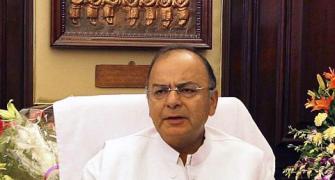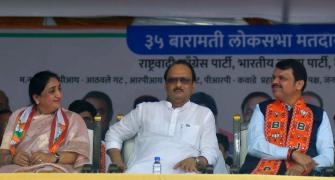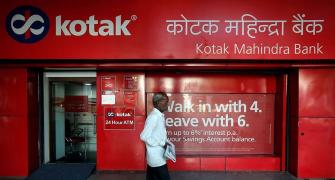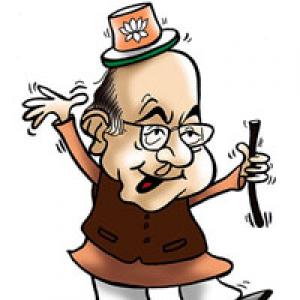Foreign investors cannot but appreciate the political thrust of the Budget, notes Claude Smadja.

The international business community has been waiting for the Budget presentation of the Modi Cabinet - its first full Budget - as a test for, and a crucial indication of, the prime minister's will and ability to undertake the significant reforms that will lead not only to a quantitative but also a qualitative jump of the country's growth capabilities.
This could not but be a very delicate balancing act between managing and meeting the expectations that had been building up - in India as well as at the international level - while taking into account the constraints of political feasibility and the need to fulfil the needs of the poorest segments of the society. It also needed to provide a much-needed improvement to business conditions.
While lacking some of the big-bang reforms that the domestic as well as the foreign business community was expecting, this is nevertheless a growth- and investment-oriented Budget that should elicit a positive reaction from foreign investors.
The target of more than eight per cent growth for 2015-16 while almost all major emerging markets are slowing down seems today achievable in view of some of the measures announced. The prospect of moving towards double-digit growth is no longer a pipe dream.
Budget 2015: Complete Coverage
What will please foreign businesses is the cumulative impact of a number of measures that will definitely make the environment not only more propitious to investment but also more reliable and transparent.
In that respect, it is worth noting, for example, the reduction of the corporate tax to 25 per cent over the next four years, the modification of the permanent establishment norms and the officialisation of the policy to avoid retrospective tax provisions.
The elements of tax clarification have been among the key expectations of foreign businesses.
In the same way, investors will be pleased by the extension of the visa-on-arrival regime to 150 countries. This is supposed to alleviate what has been in many cases a bureaucratic nightmare for businesspeople wishing to come to India - although more will have to be done to ensure the swift provision of visas and the elimination of some inept requirements that seem designed with no rationale other than discouraging people from visiting India.
Even more significant should be the replacement of the existing types of foreign investment caps by composite caps. This should clear the maze of directives and requirements foreign investors have had to navigate through. The opening of some alternative investment funds to foreign investors is also similarly significant.
Other major steps forward include the planned introduction of the goods and services tax by April 2016. This will not only create a much stronger basis for government revenues, but it will also simplify doing business throughout India considerably. This might be one of the most important pronouncements of this year's Budget.
The second step forward is the significant additional thrust on the infrastructure sector, with the increase of Rs 70,000 crore, the plan to create tax-free infrastructure bonds and the setting up of a national infrastructure investment fund - as well as the plan to launch five new "ultra mega" power projects.
This should help revive the interest of private investors - which had been absent in the last few years, for obvious reasons. What has been announced should help revive the investors' interest in public-private-partnership projects.
However, one needs to see what will happen with the ordinance on land acquisition. Passing it is crucial for an easing the process of land acquisition. Without it, many plans for infrastructure development will continue to remain stuck.
Also very significant for its impact as well as for the message it sends to the domestic and foreign community is the impetus that the Budget means to give to entrepreneurship, the development of start-ups and research and development, and the promotion of e-commerce.
Of course, as with every Budget, it is easy to point out what measure is lacking or what could have been even more forcefully initiated.
For example, there should not be much disappointment about the decision to postpone the achievement of the three per cent of GDP deficit target to three years rather than two.
This is the price to pay for helping increase the purchasing power of the man in the street - provided Prime Minister Modi remains ruthless in his objective to tackle corruption, waste and the diversion of public resources.
However, what needs truly to be taken into account is the overall thrust of the Budget. In that respect foreign investors cannot but appreciate the evident political orientation of shooting for growth, of easing business conditions - India is 149 out of 189 in the World Bank "ease of doing business" ranking.
They also stand to benefit from the effort clearly expressed in the Budget to make the banking sector sounder, to increase the efficiency of the financial markets and to try to rein in the shadow or "black" economy.
What was started already last July with the supplementary Budget and is confirmed by the 2015-16 Budget is the consistent and pragmatic approach of creating a set of complementary measures that will translate into reality the "Make in India" slogan - the emphasis on expanding the industrial and manufacturing base of the country.
The Modi government has obviously decided to seize the opportunity of a more positive macroeconomic environment, domestically as well as at the international level, as of an easing of inflation pressures to lay the basis and set the elements of a reform and growth strategy.
Overall, this is bound to get a welcome reception from the international business community. But everybody knows that if reform is good, implementation is even better.
In that respect, Prime Minister Modi and his finance minister will have to prove again and again how fully justified their reputation of efficient doers is.
Budget 2015: Complete Coverage
The writer is president of Smadja & Smadja, a Strategic Advisory Firm.










